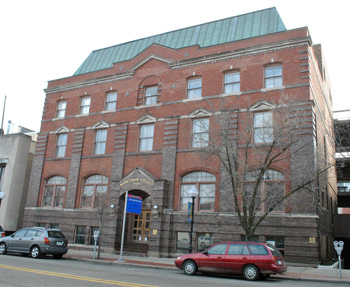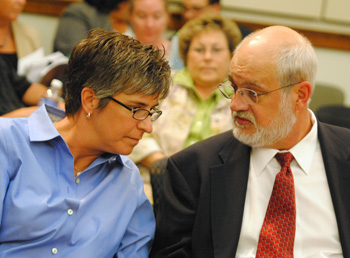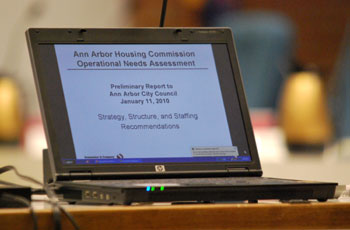New Plan Proposed for County Infrastructure
A reorganization of Washtenaw County facilities is underway, spurred in part by excess building capacity and a push to cut expenses. As a result, some departments and programs will be relocated, and the long-time leasing of some sites might be eliminated.

The County Annex building at 110 N. Fourth was built in 1904 and houses several county units, including the public defender's office, the office of community and economic development, Project Outreach (PORT) and the Washtenaw Housing Alliance. Total annual operating costs were $407,206 in 2010. (Photos by the writer.)
The Washtenaw County board of commissioners were briefed on these plans at their most recent working session by Greg Dill, infrastructure management director. The March 8 briefing included an update on information technology infrastructure, which Dill also oversees.
Washtenaw County owns about 1 million square feet of building space and about 62 miles of fiber network. Building operating costs in 2010 – the most recent data available – totaled $9.979 million, including $1.62 million for utilities and $965,800 for security, primarily at the county courthouses.
Dill told commissioners that the goal is to be more strategic about the use of facilities, in part by maximizing occupancy at county-owned buildings and minimizing the amount of leased space. The county pays about $500,000 annually for two major leases in the city of Ypsilanti, both used for Michigan Works workforce development programs: at the KeyBank building at 301 W. Michigan Ave., and at 300 Harriet St. on the south side of town.
The space plan Dill and his staff are developing includes making better use of the county’s Zeeb Road facility, which has been partially vacant. In the short term, offices of the Washtenaw Community Health Organization will move there, freeing up space in their current location – at 555 Towner in Ypsilanti – for possible use by the workforce development programs. In the long term, the Zeeb Road site might be the future home for 911 dispatch operations, which the county recently consolidated with the city of Ann Arbor.
Two other properties are being evaluated for possible sale: (1) the vacant building and land on Platt Road, site of the former juvenile justice center; and (2) the Head Start building at 1661 Leforge in Ypsilanti. The county is relinquishing the administration of Head Start later this year.
Dill also talked about his goal of cutting annual operational costs by $1 million, through a combination of eliminating leases and creating energy efficiencies – migrating to LED lights, for example. Efforts to cut energy expenses were supported by several commissioners, as was the plan to hire an energy manager for the county. Commissioner Leah Gunn noted that several years ago the county had invested heavily in what’s known as the Chevron project, a multi-year contract aimed at cutting energy costs. She asked for an update on the effectiveness of that effort, which Dill said he’d provide. [Full Story]







